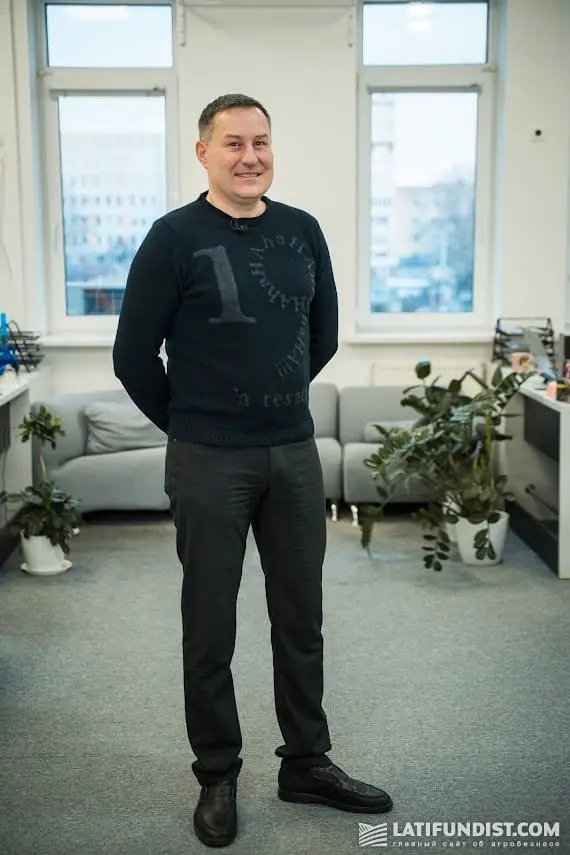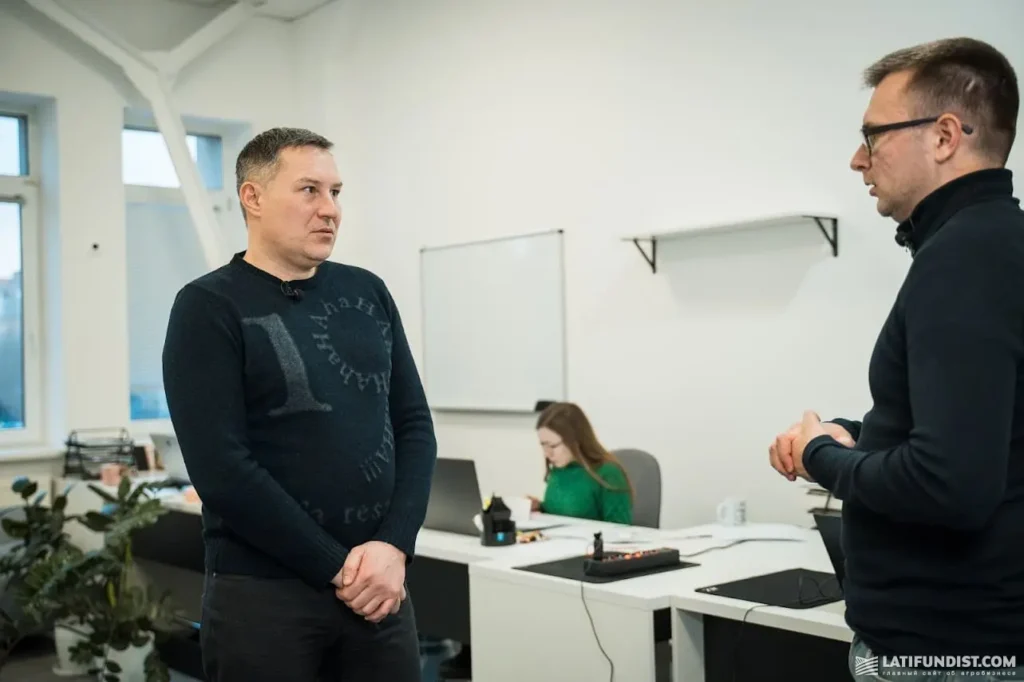Andrii Khaliavka on the marginality of the fertilizer business, price dumping and why a partner left GROSSDORF
In the second part of the interview with Andriy Khalyavka, CEO and owner of GROSSDORF, we will dive into the company’s internal transformations and the challenges it faced last year. Why did a partner leave GROSSDORF, why is it important to have opponents in your own team, and what are the biggest mistakes Andriy Khalyavka made in his work? We will also discuss how marginal fertilizer production is today, why farmers still distrust Ukrainian NPK producers, and when GROSSDORF will start producing RCP. And we will also decide who still forms prices on the market – Ostchem or importers?
About the team and why it is important for the manager to listen to them
Latifundist.com: Andriy, the last time we spoke, you were a co-owner of the company. Now you are the sole owner. If it’s not a secret, why did you decide to “divorce” your partner?
Andriy Khalyavka: It’s not a secret. Ruslan and I have a great relationship. The process of buying out his share is still ongoing, although the decision was made a long time ago, we just didn’t publicize it. Ruslan has achieved what he wanted and decided to choose a quieter life. The owner or top manager of an agricultural company, let alone a fertilizer company, always works under high stress. Especially when you live almost 24/7 for several months. Over the 17 years that our company has been in existence, we have had many tense moments. We have reached certain heights, managed to implement many projects and get good results. Ruslan decided that this was enough for him.
Latifundist.com: I know a holding company executive who resigned from his position as CEO because he was bored by the lack of alternative opinions within the team. He said it was important to have people who could object, stop, and express a different opinion. Do you agree with this?
Andriy Khalyavka: Absolutely. A company should have people with different views, even if they are not always pleasant to you. When you have only those around you who play along, it’s comfortable, but you lose objectivity and focus. The more points of view you have, the better decisions you can make.
We have an atmosphere of openness in the company – people are not afraid to express their opinions, and there are no penalties for this. I always listen to different opinions, but I am still responsible for the final decision. Whether it’s right or wrong, you make the decision based on the information you receive and your life experience. Even if five people told you to do this, you did it, and if it didn’t work out, you are still the only one to blame.
Latifundist.com: People often talk about successes, but have you had any major mistakes?
Andriy Khalyavka: Mistakes do happen. The biggest ones are usually related to greed. In general, the worst thing for a businessman is greed. This is why wrong decisions are often made. For example, sometimes the temptation to save money leads to choosing an unreliable supplier. At first, everything goes well, and then problems arise, such as delays or disruptions in deliveries. Perhaps these were the biggest miscalculations in my business practice.

Dumping in the market
Latifundist.com: Going back to our conversation last year, you mentioned that during the Great War, many new players emerged, and some of them had to dump in order to survive. Has this situation changed?
Andriy Khalyavka: Dumping occurs when market participants – producers or traders – sell goods at lower prices. The reasons can be different: someone urgently needs money or wants to keep a client. Sometimes this is done if they expect prices to fall further and want to sell earlier, before the price drops even further. In general, there are almost no other significant reasons for dumping.
Latifundist.com: You told me that your UAN was 1-2 thousand UAH/t cheaper than others. Can this be considered dumping?
Andriy Khalyavka: Actually, it was about NPK. The situation is different for UAN. As for NPK, the price is still 1-3 thousand UAH/t lower. The reason is that Ukrainian farmers have a certain distrust of Ukrainian NPK producers because of their previous experience. While they trust our UAN and know that it is a quality product with timely delivery, the situation with NPK is more complicated.
That’s why we are working to improve the quality of NPK, experimenting with raw materials and equipment, but we are still a year and a half away from the ideal technology. We have now switched to a smaller granule: if earlier it had a diameter of 5-6 mm, now it is 3.5-5 mm. Thanks to this, farmers do not have to worry that our NPK granules will not pass through the imported equipment used for precision farming.
Latifundist.com: Is the NPK market capacity increasing in general?
Andriy Khalyavka: The potential of the NPK market is millions of tons. Currently, we do not reach even half of the application rates that we had in the Soviet Union, and we are even further behind Western standards. Until 2022, the market was growing rapidly, but the war put this process on hold. The loss of land and farmers’ uncertainty about the future reduced demand and the ability of traders to provide timely and adequate supplies.
Prospects for the RCA market
Latifundist.com: By the way, did you ever think of returning to R&D production after the dry year last year?
Andriy Khalyavka: We will definitely come back to this. R&D is a very promising topic, and Ukraine, farmers, and manufacturers need it. We have a partner in this area, Maxim Panchev (CIAT), but he is currently at the front. So we are waiting for him to return to resume this area, as it is a very responsible business that requires a professional approach. I don’t want to take any risks without him. In addition, I am convinced that Ostchem should start production of RCS.
Latifundist.com:Will others follow?
Andriy Khalyavka: Of course. When the market grows from 20 thou tons to 200 thou tons, it will popularize the RCA among farmers. They will start using it more often, prices will become more affordable, and the market will start to develop actively.
Latifundist.com: Although you told me that this market is narrow. But we see that more and more manufacturers are entering it.
Andriy Khalyavka: There are manufacturers who believe that it is enough to supply equipment and they can start working. But this is not the case. Fertilizer production requires not only equipment but also a full package of permits, as we operate in a legal framework.

How Ostchem influences pricing
Latifundist.com: We often talk about Ostchem. Is it a monopolist, a price-determining company, a competitor? Or, as they say, is it more complicated?
Andriy Khalyavka: Of course, everything is complicated (laughs – ed.). I started my career at Cherkasy Azot as a domestic sales analyst, so I know the system well. It is my alma mater. We have come a long way with Ostchem. We are not cooperating now. They are primarily our competitors. Or rather, I am a small competitor for them, which I hope motivates them to improve their products and approaches. Similarly, my competitors motivate me to become better.
Latifundist.com: So who has more influence on pricing – Ostchem or importers?
Andriy Khalyavka: Mostly Ostchem. Even if importers bring in large quantities of products at a certain price, Ostchem can always offer a lower price and push out competitors. Importers brought in a lot of nitrate at 20 thousand UAH/t, and Ostchem will take it and supply it at 19 UAH/t. And that’s it.
Latifundist.com:And this is despite the fact that Severodonetsk Azot is under occupation.
Andriy Khalyavka: Only Cherkasy Azot alone can meet the entire demand of the Ukrainian market for nitrogen fertilizers. From time to time, they simply lack financial resources, gas, or demand. After all, production should also bring a certain margin. They can produce, relatively speaking, 150 thousand tons of fertilizers per month. But who will buy them in the summer? Nobody. Where to load it all, where to store it? All these factors prevent them from operating at full capacity throughout the year.
On cooperation with traders and agricultural holdings
Latifundist.com: Last year, you increased sales by 20%. What was the reason for this?
Andriy Khalyavka: The main role was played by a successful procurement policy and cooperation with reliable partners. We were able to get raw materials at a favorable price, which gave us a competitive advantage and allowed us to maintain low margins with high sales volumes.

Latifundist.com: What share of your sales is currently accounted for by distributors?
Andriy Khalyavka: We call our distributors traders. One and the same trader can be both a competitor and a partner. In general, sales on the market account for about 15%. This share may vary slightly, but in general it is not decisive.
Latifundist.com: Then what is the share of the top ten agricultural holdings, say, in Ukraine?
Andriy Khalyavka: Working with the top ten holdings is primarily a marketing and advertising ploy. Large holdings have significant working capital, analytical teams and specialists who closely monitor the market. They are well aware of the situation and make purchases with a high level of professionalism. At the same time, the profitability of cooperation with such holdings is rather low. Yes, at the beginning of the business, every company wants to work with them, but over time, it becomes clear that this means big commitments and responsibility with minimal margins. That is why we currently cooperate with 3-4 holdings out of the top ten, but our supply volumes are not significant for them.
What about margins for fertilizer producers
Latifundist.com: What about the overall margins in fertilizer production?
Andrii Khaliavka: If a producer gets 3% margin, it is bad. However, this 3% does not include capital repairs and depreciation, which also make up a significant share of costs. 5% is an operating margin, and 7% is already a good indicator. If a company has 7%, it is a really great result.
Latifundist.com: For many farmers during the war, the history of fertilizer storage is relevant. On the one hand, you want to stock up on fertilizers, but on the other hand, you are afraid to concentrate them in one place. If I remember correctly, you provide a fertilizer storage service.
Andrii Khaliavka: Yes, and the cost of storage is already included in the price of the product. That is, when a farmer buys fertilizer, he also gets storage and, if it is UAN, delivery. If we are talking about UAN, our facilities allow us to store up to 30 thousand tons in different locations at the same time.
In addition, we can store UAN in the form of raw materials and produce the finished product immediately before shipping it to the customer. Therefore, we do not charge for storage. It is all included in the price of the product. Although there are many companies on the market that charge for this. There are even specialized companies that deal specifically with the storage of liquid fertilizers.
Why you shouldn’t be afraid of European integration and the Green Deal
Latifundist.com: You have been on the market for 17 years. How have fertilizer production technologies changed over this time?
Andrii Khaliavka: Fundamentally, the products themselves have not changed much. The variety of fertilizers with different macronutrient content has increased, but the main types have remained the same. The main changes are in agronomic technologies and methods of fertilizer application.
Latifundist.com: Ukraine is moving towards European integration, and many farmers are afraid of the ‘green course’, which means reducing the use of mineral fertilizers. At the same time, you say that we have not yet reached the level of fertilization that was in the Soviet Union, let alone the EU standards. So, my conclusion is that in terms of mineral nutrition, we should not be afraid of these standards, or am I wrong?
Andriy Khalyavka: The problem of carbon footprint is not relevant for Ukraine at the moment, as we are far behind the global average of fertilizer application per hectare. However, any strict restrictions in this area will lead to a decrease in yields, which will lead to higher prices and food shortages. This could become a real humanitarian disaster.
The story of organic food is, frankly, a luxury for the rich. People who have the financial means to buy more expensive nitrate-free products can afford this choice. But there are millions of people in the world who receive food as part of UN humanitarian aid programs, and without this help, they simply will not survive.
Therefore, a global reduction in fertilizer use will lead to a decrease in food production and exacerbate the problem of hunger. These environmental trends look good in theory, but their practical implementation on a global scale or even in a single agricultural country like Ukraine is unlikely. Organic production is possible only in certain locations where nitrates, pesticides, herbicides, or chemical fertilizers are not used. But such products will always be much more expensive and will remain available only to wealthy consumers. Mass adoption of such practices on a global scale is currently impossible.

Latifundist.com: The company has recently passed the symbolic mark of 1 million tons of fertilizer produced. Did you celebrate the “first million”?
Andriy Khalyavka: We did not celebrate in any way. Last year, we worked 24/7 and did not even realize at first what scale we had achieved. In fact, the final figure turned out to be higher than the one we initially announced – GROSSDORF has already produced more than 1.14 thousand tons of fertilizers. That is, we even downplayed our achievements. By the way, the production of our flagship product – UAN – will also soon reach the 1 million tons mark.
Latifundist.com: Thank you for an interesting and informative conversation!